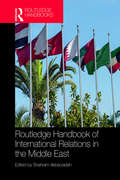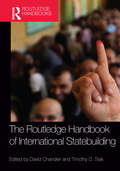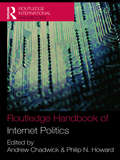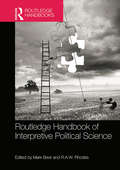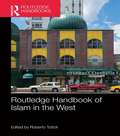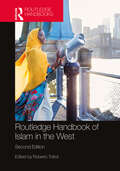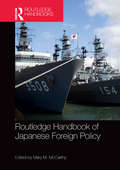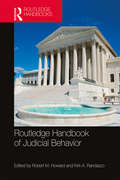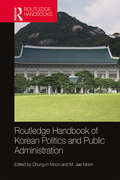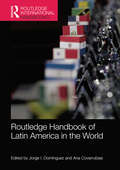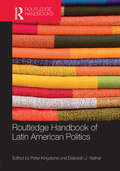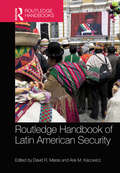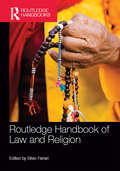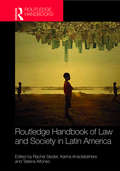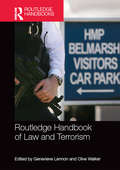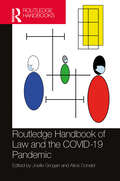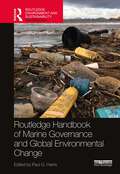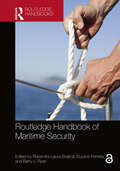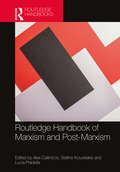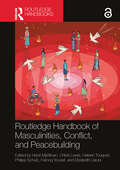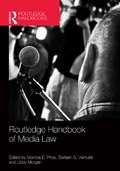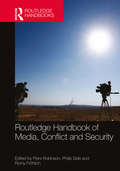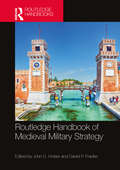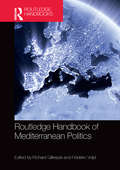- Table View
- List View
Routledge Handbook of International Relations in the Middle East
by Shahram AkbarzadehThis handbook examines the regional and international dynamics of the Middle East. It challenges the state society dichotomy to make sense of decision-making and behavior by ruling regimes. The 33 chapter authors include the world’s leading scholars of the Middle East and International Relations (IR) in order to make sense of the region. This synthesis of area studies expertise and IR theory provides a unique and rigorous account of the region’s current dynamics, which have reached a crisis point since the beginning of the Arab Spring. The Middle East has been characterized by volatility for more than a century. Although the region attracts significant scholarly interest, IR theory has rarely been used as a tool to understand events. The constructivist approach in IR highlights the significance of state identity, shaped by history and culture, in making sense of international relations. The authors of this volume consider how IR theory can elucidate the patterns and principles that shape the region, in order to provide a rigorous account of the contemporary challenges of the Middle East. The Routledge Handbook of International Relations in the Middle East provides comprehensive coverage of International Relations issues in the region. Thus, it offers key resources for researchers and students interested in International Relations and the Middle East.
Routledge Handbook of International Statebuilding
by David Chandler Timothy D. SiskThis new Handbook offers a combination of theoretical, thematic and empirical analyses of the statebuilding regime, written by leading international scholars. Over the past decade, international statebuilding has become one of the most important and least understood areas of international policy-making. Today, there are around one billion people living in some 50-60 conflict-affected, 'fragile' states, vulnerable to political violence and civil war. The international community grapples with the core challenges and dilemmas of using outside force, aid, and persuasion to build states in the wake of conflict and to prevent such countries from lapsing into devastating violence. The Routledge Handbook of International Statebuilding is a comprehensive resource for this emerging area in International Relations. The volume is designed to guide the reader through the background and development of international statebuilding as a policy area, as well as exploring in depth significant issues such as security, development, democracy and human rights. Divided into three main parts, this Handbook provides a single-source overview of the key topics in international statebuilding: Part One: Concepts and Approaches Part Two: Security, Development and Democracy Part Three: Policy Implementation This Handbook will be essential reading for students of statebuilding, humanitarian intervention, peacebuilding, development, war and conflict studies and IR/Security Studies in general.
Routledge Handbook of Internet Politics
by Philip N. Howard Andrew ChadwickThe politics of the internet has entered the social science mainstream. From debates about its impact on parties and election campaigns following momentous presidential contests in the United States, to concerns over international security, privacy and surveillance in the post-9/11, post-7/7 environment; from the rise of blogging as a threat to the traditional model of journalism, to controversies at the international level over how and if the internet should be governed by an entity such as the United Nations; from the new repertoires of collective action open to citizens, to the massive programs of public management reform taking place in the name of e-government, internet politics and policy are continually in the headlines. The Routledge Handbook of Internet Politics is a collection of over thirty chapters dealing with the most significant scholarly debates in this rapidly growing field of study. Organized in four broad sections: Institutions, Behavior, Identities, and Law and Policy, the Handbook summarizes and criticizes contemporary debates while pointing out new departures. A comprehensive set of resources, it provides linkages to established theories of media and politics, political communication, governance, deliberative democracy and social movements, all within an interdisciplinary context. The contributors form a strong international cast of established and junior scholars. This is the first publication of its kind in this field; a helpful companion to students and scholars of politics, international relations, communication studies and sociology.
Routledge Handbook of Interpretive Political Science
by Mark Bevir R. A. RhodesInterpretive political science focuses on the meanings that shape actions and institutions, and the ways in which they do so. This Handbook explores the implications of interpretive theory for the study of politics. It provides the first definitive survey of the field edited by two of its pioneers. Written by leading scholars from a range of disciplinary backgrounds, the Handbook’s 32 chapters are split into five parts which explore: the contrast between interpretive theory and mainstream political science; the main forms of interpretive theory and the theoretical concepts associated with interpretive political science; the methods used by interpretive political scientists; the insights provided by interpretive political science on empirical topics; the implications of interpretive political science for professional practices such as policy analysis, planning, accountancy, and public health. With an emphasis on the applications of interpretive political science to a range of topics and disciplines, this Handbook is an invaluable resource for students, scholars, and practitioners in the areas of international relations, comparative politics, political sociology, political psychology, and public administration.
Routledge Handbook of Islam in the West
by Roberto TottoliIslam has long been a part of the West in terms of religion, culture, politics and society. Discussing this interaction from al-Andalus to the present, this Handbook explores the influence Islam has had, and continues to exert; particularly its impact on host societies, culture and politics. Highlighting specific themes and topics in history and culture, chapters cover: European paradigms Muslims in the Americas Cultural interactions Islamic cultural contributions to the Western world Western contributions to Islam Providing a sound historical background, from which a nuanced overview of Islam and Western society can be built, the Routledge Handbook of Islam in the West brings to the fore specific themes and topics that have generated both reciprocal influence, and conflict. Presenting readers with a range of perspectives from scholars based in Europe, the US, and the Middle East, this Handbook challenges perceptions on both western and Muslim sides and will be an invaluable resource for policymakers and academics with an interest in the History of Islam, Religion and the contemporary relationship between Islam and the West.
Routledge Handbook of Islam in the West
by Roberto TottoliWith new topics and contributions, this updated second edition discusses the history and contemporary presence of Islam in Europe and America. The book debates the relevance and multi-faceted participation of Muslims in the dynamics of Western societies, challenging the changing perception on both sides. Collating over 30 chapters, written by experts from around the world, the volume presents a wide range of perspectives. Case studies from the Muslim presence in the Iberian Peninsula between the Middle Ages and the modern age set off the Handbook, along with an outline of Muslims in America up to the twentieth century. The second part covers concepts around new conditions in terms of consolidating identities, the emergence of new Muslim actors, the appearance of institutions and institutional attitudes, the effects of Islamic presence on the arts and landscapes of the West, and the relational dynamics like ethics and gender. Exploring the influence of Islam, particularly its impact on society, culture and politics, this interdisciplinary volume is a key resource for policymakers, academics and students interested in the history of Islam, religion and the contemporary relationship between Islam and the West.
Routledge Handbook of Japanese Foreign Policy
by Mary M. McCarthyFrom a nuclear North Korea and territorial disputes in the East China Sea, to global climate change and Asia-Pacific free trade agreements, Japan is at the center of some of the most challenging issues that the world faces today. Taking an interdisciplinary approach, comprising contributions from the fields of politics, sociology, history, and gender studies, this handbook creates a comprehensive and innovative overview of the field, investigating the widening variety of interests, sometimes competing, that constitute Japanese foreign policy. Organized topically, it is divided into sections, including: • Japan’s evolving foreign policy landscape • Global environmental and sustainable development • International and national security • International political economy • International norms and civil society. Providing an evaluation of the key actors, institutions, and networks influencing Japanese foreign policy, the Routledge Handbook of Japanese Foreign Policy is an essential resource for students and scholars of Japanese and Asian Politics, International Relations, and Foreign Policy.
Routledge Handbook of Judicial Behavior
by Robert M. Howard Kirk A. RandazzoInterest in social science and empirical analyses of law, courts and specifically the politics of judges has never been higher or more salient. Consequently, there is a strong need for theoretical work on the research that focuses on courts, judges and the judicial process. The Routledge Handbook of Judicial Behavior provides the most up to date examination of scholarship across the entire spectrum of judicial politics and behavior, written by a combination of currently prominent scholars and the emergent next generation of researchers. Unlike almost all other volumes, this Handbook examines judicial behavior from both an American and Comparative perspective. Part 1 provides a broad overview of the dominant Theoretical and Methodological perspectives used to examine and understand judicial behavior, Part 2 offers an in-depth analysis of the various current scholarly areas examining the U.S. Supreme Court, Part 3 moves from the Supreme Court to examining other U.S. federal and state courts, and Part 4 presents a comprehensive overview of Comparative Judicial Politics and Transnational Courts. Each author in this volume provides perspectives on the most current methodological and substantive approaches in their respective areas, along with suggestions for future research. The chapters contained within will generate additional scholarly and public interest by focusing on topics most salient to the academic, legal and policy communities.
Routledge Handbook of Korean Politics and Public Administration
by Chung-in Moon, M. Jae MoonThe Routledge Handbook of Korean Politics and Public Administration gathers the expertise of leading international scholars to survey the full spectrum of contemporary South Korean international relations, public management, and public policies. Divided into four parts, the handbook covers a range of issues including: domestic Korean political parties, elections and leadership, foreign policy, national security and relations with North Korea, public administration, governance and finance, and economic, social and environmental public policies. Offering a complete overview of the field, the handbook is an invaluable resource for academics, researchers, policy analysts, graduate and undergraduate students studying South Korean Politics and International Relations as well as East Asian Politics.
Routledge Handbook of Latin America in the World
by Jorge I. Domínguez and Ana CovarrubiasThe Handbook of Latin America in the World explains how the Latin American countries have both reacted and contributed to changing international dynamics over the last 30 years. It provides a comprehensive picture of Latin America’s global engagement by looking at specific processes and issues that link governments and other actors, social and economic, within the region and beyond. Leading scholars offer an up-to-date state of the field, theoretically and empirically, thus avoiding a narrow descriptive approach. The Handbook includes a section on theoretical approaches that analyze Latin America’s place in the international political and economic system and its foreign policy making. Other sections focus on the main countries, actors, and issues in Latin America’s international relations. In so doing, the book sheds light on the complexity of the international relations of selected countries, and on their efforts to act multilaterally. The Routledge Handbook of Latin America in the World is a must-have reference for academics, researchers, and students in the fields of Latin American politics, international relations, and area specialists of all regions of the world.
Routledge Handbook of Latin American Politics
by Peter Kingstone Deborah J. YasharLatin America has been one of the critical areas in the study of comparative politics. The region’s experiments with installing and deepening democracy and promoting alternative modes of economic development have generated intriguing and enduring empirical puzzles. In turn, Latin America’s challenges continue to spawn original and vital work on central questions in comparative politics: about the origins of democracy; about the relationship between state and society; about the nature of citizenship; about the balance between state and market. The richness and diversity of the study of Latin American politics makes it hard to stay abreast of the developments in the many sub-literatures of the field. The Routledge Handbook of Latin American Politics offers an intellectually rigorous overview of the state of the field and a thoughtful guide to the direction of future scholarship. Kingstone and Yashar bring together the leading figures in the study of Latin America to present extensive empirical coverage, new original research, and a cutting-edge examination of the central areas of inquiry in the region.
Routledge Handbook of Latin American Security
by Arie M. Kacowicz David R. MaresThis new Handbook is a comprehensive collection of cutting-edge essays on all aspects of Latin American Security by a mix of established and emerging scholars. The Routledge Handbook of Latin American Security identifies the key contemporary topics of research and debate, taking into account that the study of Latin America’s comparative and international politics has undergone dramatic changes since the end of the Cold War, the return of democracy and the re-legitimization and re-armament of the military against the background of low-level uses of force short of war. Latin America’s security issues have become an important topic in international relations and Latin American studies. This Handbook sets a rigorous agenda for future research and is organised into five key parts: • The Evolution of Security in Latin America • Theoretical Approaches to Security in Latin America • Different 'Securities' • Contemporary Regional Security Challenges • Latin America and Contemporary International Security Challenges With a focus on contemporary challenges and the failures of regional institutions to eliminate the threat of the use of force among Latin Americans, this Handbook will be of great interest to students of Latin American politics, security studies, war and conflict studies and International Relations in general.
Routledge Handbook of Law and Religion
by Silvio FerrariThe field of law and religion studies has undergone a profound transformation over the last thirty years, looking beyond traditional relationships between State and religious communities to include rights of religious liberty and the role of religion in the public space. This handbook features new, specially commissioned papers by a range of eminent scholars that offer a comprehensive overview of the field of law and religion. The book takes on an interdisciplinary approach, drawing from anthropology, sociology, theology and political science in order to explore how laws and court decisions concerning religion contribute to the shape of the public space. Key themes within the book include: Religions symbols in the public space; Religion and security; Freedom of religion and cultural rights; Defamation and hate speech; Gender, religion and law; This advanced level reference work is essential reading for students, researchers and scholars of law and religion, as well as policy makers in the field.
Routledge Handbook of Law and Society in Latin America
by Rachel Sieder Karina Ansolabehere Tatiana A. Alfonso SierraAn understanding of law and its efficacy in Latin America demands concepts distinct from the hegemonic notions of "rule of law" which have dominated debates on law, politics and society, and that recognize the diversity of situations and contexts characterizing the region. The Routledge Handbook of Law and Society in Latin America presents cutting-edge analysis of the central theoretical and applied areas of enquiry in socio-legal studies in the region by leading figures in the study of law and society from Latin America, North America and Europe. Contributors argue that scholarship about Latin America has made vital contributions to longstanding and emerging theoretical and methodological debates on the relationship between law and society. Key topics examined include: The gap between law-on-the-books and law in action The implications of legal pluralism and legal globalization The legacies of experiences of transitional justice Emerging forms of socio-legal and political mobilization Debates concerning the relationship between the legal and the illegal. The Routledge Handbook of Law and Society in Latin America sets out new research agendas for cross-disciplinary socio-legal studies and will be of interest to those studying law, sociology of law, comparative Latin American politics, legal anthropology and development studies.
Routledge Handbook of Law and Terrorism
by Clive Walker Genevieve LennonIn the years since 9/11, counter-terrorism law and policy has proliferated across the world. This handbook comprehensively surveys how the law has been deployed in all aspects of counter-terrorism. It provides an authoritative and critical analysis of counter-terrorism laws in domestic jurisdictions, taking a comparative approach to a range of jurisdictions, especially the UK, the US, Australia, Canada, and Europe. The contributions to the book are written by experts in the field of terrorism law and policy, allowing for discussion of a wide range of regulatory responses and strategies of governance. The book is divided into four parts, reflective of established counter-terrorism strategic approaches, and covers key themes such as: Policing and special powers, including surveillance Criminal offences and court processes Prevention of radicalisation and manifestations of extremism Protective/preparative security The penology of terrorism In addressing counter-terrorism laws across a broad range of topics and jurisdictions, the handbook will be of great interest and use to researchers, students and practitioners in criminal law, counter-terrorism, and security studies.
Routledge Handbook of Law and the COVID-19 Pandemic (Routledge Handbooks in Law)
by Joelle Grogan and Alice DonaldThe COVID-19 pandemic not only ravaged human bodies but also had profound and possibly enduring effects on the health of political and legal systems, economies and societies. Almost overnight, governments imposed the severest restrictions in modern times on rights and freedoms, elections, parliaments and courts. Legal and political institutions struggled to adapt, creating a catalyst for democratic decline and catastrophic increases in poverty and inequality. This handbook analyses the global pandemic response through five themes: governance and democracy; human rights; the rule of law; science, public trust and decision making; and states of emergency and exception. Containing 12 thematic commentaries and 25 chapters on countries of diverse size, wealth and experience of COVID-19, it represents the combined effort of more than 50 contributors, including leading scholars and rising voices in the fields of constitutional, international, public health, human rights and comparative law, as well as political science, and science and technology studies. Taking stock after the onset of global emergency, this book provides essential analysis for politicians, policy-makers, jurists, civil society organisations, academics, students and practitioners at both national and international level on the best, and most concerning, practices adopted in response to COVID-19 – and key insights into how states and multilateral institutions should reform, adapt and prepare for future emergencies.
Routledge Handbook of Marine Governance and Global Environmental Change (Routledge Environment and Sustainability Handbooks)
by Paul G. HarrisThis comprehensive handbook provides a detailed and unique overview of current thinking about marine governance in the context of global environmental change. Many of the most profound impacts of global environmental change, and climate change in particular, will occur in the oceans. It is vital that we consider the role of marine governance in adapting to and mitigating these impacts. This comprehensive handbook provides a thorough review of current thinking about marine environmental governance, including law and policy, in the context of global environmental change. Initial chapters describe international law, regimes, and leadership in marine environmental governance, in the process considering how existing regimes for climate change and the oceans should and can be coordinated. This is followed by an exploration of the role of non-state actors, including scientists, nongovernmental organisations, and corporations. The next section includes a collection of chapters highlighting governance schemes in a variety of marine environments and regions, including coastlines, islands, coral reefs, the open ocean, and regional seas. Subsequent chapters examine emerging issues in marine governance, including plastic pollution, maritime transport, sustainable development, environmental justice, and human rights. Providing a definitive overview, the Routledge Handbook of Marine Governance and Global Environmental Change is suitable for advanced students in marine and environmental governance, environmental law and policy, and climate change, as well as practitioners, activists, stakeholders, and others concerned about the world’s oceans and seas.
Routledge Handbook of Maritime Security
by Susana Ferreira Barry J. Ryan Ruxandra-Laura BoşilcăThis handbook offers a critical and substantial analysis of maritime security and documents the most pressing strategic, economic, socio-cultural and legal questions surrounding it. Written by leading international experts, this comprehensive volume presents a wide variety of theoretical positions on maritime security, detailing its achievements and outlining outstanding issues faced by those in the field. The book includes studies which cover the entire spectrum of activity along which maritime security is developing, including, piracy, cyber security, energy security, terrorism, narco-subs and illegal fishing. Demonstrating the transformative character and potential of the topic, the book is divided into two parts. The first part exhibits a range of perspectives and new approaches to maritime security, and the second explores emerging developments in the practice of security at sea, as well as regional studies written by local maritime security experts. Taken together, these contributions provide a compelling account of the evolving maritime security environment, casting fresh light on theoretical and empirical aspects.The book will be of much interest to practitioners and students of maritime security, naval studies, security studies, maritime history, and International Relations in general.
Routledge Handbook of Maritime Security
by Ruxandra-Laura BoşilcăThis handbook offers a critical and substantial analysis of maritime security and documents the most pressing strategic, economic, socio-cultural and legal questions surrounding it. Written by leading international experts, this comprehensive volume presents a wide variety of theoretical positions on maritime security, detailing its achievements and outlining outstanding issues faced by those in the field. The book includes studies which cover the entire spectrum of activity along which maritime security is developing, including, piracy, cyber security, energy security, terrorism, narco-subs and illegal fishing. Demonstrating the transformative character and potential of the topic, the book is divided into two parts. The first part exhibits a range of perspectives and new approaches to maritime security, and the second explores emerging developments in the practice of security at sea, as well as regional studies written by local maritime security experts. Taken together, these contributions provide a compelling account of the evolving maritime security environment, casting fresh light on theoretical and empirical aspects. The book will be of much interest to practitioners and students of maritime security, naval studies, security studies, maritime history, and International Relations in general.
Routledge Handbook of Marxism and Post-Marxism
by Alex Callinicos; Stathis Kouvelakis; Lucia PradellaIn the past two decades, Marxism has enjoyed a revitalization as a research program and a growth in its audience. This renaissance is connected to the revival of anti-capitalist contestation since the Seattle protests in 1999 and the impact of the global economic and financial crisis in 2007–8. It intersects with the emergence of Post-Marxism since the 1980s represented by thinkers such as Jürgen Habermas, Chantal Mouffe, Ranajit Guha and Alain Badiou. This handbook explores the development of Marxism and Post-Marxism, setting them in dialogue against a truly global backdrop. Transcending the disciplinary boundaries between philosophy, economics, politics and history, an international range of expert contributors guide the reader through the main varieties and preoccupations of Marxism and Post-Marxism. Through a series of framing and illustrative essays, readers will explore these traditions, starting from Marx and Engels themselves, through the thinkers of the Second and Third Internationals (Rosa Luxemburg, Lenin and Trotsky, among others), the Tricontinental, and Subaltern and Post-Colonial Studies, to more contemporary figures such as Huey Newton, Fredric Jameson, Judith Butler, Immanuel Wallerstein and Samir Amin. The Routledge Handbook of Marxism and Post-Marxism will be of interest to scholars and researchers of philosophy, cultural studies and theory, sociology, political economics and several areas of political science, including political theory, Marxism, political ideologies and critical theory.
Routledge Handbook of Masculinities, Conflict, and Peacebuilding
by Heleen Touquet Henri Myrttinen Farooq Yousaf Philipp Schulz Chloé Lewis Elizabeth LaruniThis handbook engages with and broadens current debates on men and masculinities in conflict and peacebuilding.Through an expansive range of chapters across a unique array of geographical settings, the volume shatters prevailing assumptions about men’s relationship to conflict and its wake. Situated across scholarship, policy, and practice, the contributions offer new possibilities for a more complex and complete picture of the gendered tapestries of conflict, peace, and the spaces in between. The handbook combines feminist, intersectional, relational, decolonial, and queer perspectives on the conceptualisation of masculinities in conflict and peacebuilding. This approach provides us with the tools to go beyond direct, physical, conflict-related violence to examine less visible forms of violence and power as well as other ways in which masculinities interact with conflict and peace. In doing so, the book permits a multi-faceted view of men’s roles, relationships, vulnerabilities, and non-violent agencies in conflict and peacebuilding across scholarship, policy, and practice.This book will be of much interest to students of gender, masculinities, peace and conflict studies, and international relations.Chapter 1, 3, 9, 13, and 30 of this book are freely available as a downloadable Open Access PDF at http://www.taylorfrancis.com under a Creative Commons Attribution-Non Commercial-No Derivatives (CC-BY-NC-ND) 4.0 license.Chapters 19 and 25 of this book is freely available as a downloadable Open Access PDF at http://www.taylorfrancis.com under a Creative Commons Attribution (CC-BY) 4.0 license.
Routledge Handbook of Media Law
by Monroe E. Price Stefaan Verhulst Libby MorganFeaturing specially commissioned chapters from experts in the field of media and communications law, this book provides an authoritative survey of media law from a comparative perspective. The handbook does not simply offer a synopsis of the state of affairs in media law jurisprudence, rather it provides a better understanding of the forces that generate media rules, norms, and standards against the background of major transformations in the way information is mediated as a result of democratization, economic development, cultural change, globalization and technological innovation. The book addresses a range of issues including: Media Law and Evolving Concepts of Democracy Network neutrality and traffic management Public Service Broadcasting in Europe Interception of Communication and Surveillance in Russia State secrets, leaks and the media A variety of rule-making institutions are considered, including administrative, and judicial entities within and outside government, but also entities such as associations and corporations that generate binding rules. The book assesses the emerging role of supranational economic and political groupings as well as non-Western models, such as China and India, where cultural attitudes toward media freedoms are often very different. Monroe E. Price is Director of the Center for Global Communication Studies at the Annenberg School for the University of Pennsylvania and Joseph and Sadie Danciger Professor of Law and Director of the Howard M. Squadron Program in Law, Media and Society at the Cardozo School of Law. Stefaan Verhulst is Chief of Research at the Markle Foundation. Previously he was the co-founder and co-director, with Professor Monroe Price, of the Programme in Comparative Media Law and Policy (PCMLP) at Oxford University, as well as senior research fellow at the Centre for Socio Legal Studies. Libby Morgan is the Associate Director of the Center for Global Communication Studies at the Annenberg School for the University of Pennsylvania.
Routledge Handbook of Media, Conflict and Security
by Philip Seib Piers Robinson Romy FrohlichThis Handbook links the growing body of media and conflict research with the field of security studies. The academic sub-field of media and conflict has developed and expanded greatly over the past two decades. Operating across a diverse range of academic disciplines, academics are studying the impact the media has on governments pursuing war, responses to humanitarian crises and violent political struggles, and the role of the media as a facilitator of, and a threat to, both peace building and conflict prevention. This handbook seeks to consolidate existing knowledge by linking the body of conflict and media studies with work in security studies. The handbook is arranged into five parts: Theory and Principles. Media, the State and War Media and Human Security Media and Policymaking within the Security State New Issues in Security and Conflict and Future Directions For scholars of security studies, this handbook will provide a key point of reference for state of the art scholarship concerning the media-security nexus; for scholars of communication and media studies, the handbook will provide a comprehensive mapping of the media-conflict field.
Routledge Handbook of Medieval Military Strategy
by Daniel P. FrankeThis Handbook provides the first comprehensive and global analysis of medieval military strategy, covering the period from the sixth to the seventeenth century.Challenging the widely held notion in modern strategic studies that medieval strategy was non-existent, the Handbook brings together leading scholars to explore a range of literatures, campaigns, laws, and contexts that highlight medieval warfare’s multifaceted contours. The scope of the work is ambitious, with over 30 chapters dedicated to analyzing strategy across six continents. From Charlemagne to Henry V and Scandinavia to Florence; southbound to Morocco then across the Sahara to Kongo; past the Adriatic to Byzantium and Georgia and the Crusades and Egypt; further still into Indian and Chinese dynasties and Japan; and finally, to Central and South America—this Handbook provides ready access to military strategy across the medieval world stage. In the process, it fills a significant gap in the history of strategy and serves to connect the ancient world with the modern, demonstrating that—whatever the period—military leaders have consistently plied warfare in the pursuit of greater ends.This Handbook will be of much interest to researchers and students of military strategy, medieval military history, and strategic studies in general.
Routledge Handbook of Mediterranean Politics
by Richard Gillespie Frédéric VolpiThe Mediterranean space, defined by a major sea, a large number of littoral countries and to some extent their hinterlands, is at the same time an interface between Europe, Africa and Asia. This brings complex challenges in terms of achieving peace and stability. Recently it has received intense international attention through the internal destructiveness and spill-over from conflicts, primarily those waged in Libya, Syria and, more remotely, Iraq. This Handbook provides an overview of the political processes that shape the Mediterranean region in the contemporary context. It explores the issues of crucial importance to Mediterranean dynamics through a series of analytical sections that guide the reader towards a comprehensive understanding of the main regional interactions and trends. The Handbook explores: the complex historical formation of the contemporary Mediterranean geopolitical perspectives issues around peace and conflict the political economy of the region the role of non-state actors and social movements societal and cultural trends. The wide range of contributions from many of the leading academic experts on the region offers not only insights into the debates and processes that structure each theme, but also key pointers for a more general understanding of how distinct political, economic, social and cultural dynamics interact across the region. It will therefore be a key resource for policy-makers and students and scholars of Mediterranean politics and international relations.
